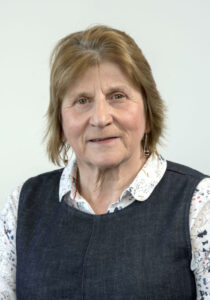
(C)DONALD MACLEOD www.donald-macleod
For over 40 years, South Uist native Mary MacInnes has been involved in the development of Gaelic language and music. Her work in a range of areas continues to bring huge benefits to both, at home and much further afield.
She’s spent much time working as a teacher in Uist, and the fourteen years before her retirement as headteacher of Sgoil an Ìochdair. She entered the profession at a turning point in Scottish Education – in many respects: The first introduction of bilingual education policy, regionalisation across the country and increases to school leaving age to name but a significant few. These changing times very much an early sign of wider social and cultural changes to come – ones she’d go on to have a hand in bringing about through learning, in her local community and beyond.
Talking about her early years on South Uist, Mary says: “The music and language was in the community but not the school. There were no Gaelic books, and when there was music we’d be learning to sing London’s Burning and As I Came Down the Gallowgate…… Even in the homes at the time, the language and music were deeply undervalued although in the community, Gaelic was the spoken language everywhere”.
Since then, much work has been done at international, national and local levels to catch up, and bring Gaelic music and language back to the fore. Work of which she’s been a part in a number of ways: Locally as a founding member of Cothrom, a well respected organisation promoting training and personal development in Uist; and founding member and development worker for Fèis Tìr a’ Mhurain – the first Gaelic-medium feis; and nationally through board memberships of the then Scottish Arts Council and MG Alba, to presently being Chair of Bord na Gaidhlig.
Perhaps her biggest contribution to the health of Gaelic music has been her work with Ceòlas. Since its inception in 1996, Ceòlas has grown from a week-long music and dance school based on South Uist, to become one of Scotland’s leading Gaelic culture, heritage and arts organisations. Celebrating its 25th anniversary next year, Mary is chair of the organisation, and has sat on the board for 20 years.
Ceòlas has been a game changer, for South Uist, and Gaelic culture more widely. The internationally renowned summer school event brings world class tutors to the island, sharing music, dance, and creativity in many different forms in a native language, community and environment. And as Mary mentions “music and culture is so critical to the development of the language itself”.
She’s now at the centre of efforts to develop a permanent home for Ceòlas. In partnership with the University of the Highlands and Islands, plans are well underway to create Cnoc Soilleir – a learning, performance, recording, archive and library facility, which will allow Ceòlas to expand their activity year-round, as well as increasing UHI’s delivery on the island. It’s an exciting development, which will bring huge benefits to Ceòlas, UHI, and the local community. As Mary put it: “There won’t be any factories or large scale productions on Uist. The real resource is the culture, and the project will allow us to capitalise on this”.
The establishment of Cnoc Soilleir will be a key development in the regeneration of Uist. The centre will be a home for Ceolas, and a resource and attraction for local people and visitors. UHI’s involvement creates an opportunity for local young people to access further and higher education without having to leave the island. It’ll bring benefits to the local economy through the visitors it will attract, and jobs it will create. More widely still, there are plans afoot to support the training of Scotland’s teachers from a Gaelic community which is a rich resource of Gaelic language, culture and music.
This most recent development from Ceòlas is a sign that the renaissance of Gaelic culture, language and music really does continue to flourish. On her own contribution, Mary said: “It’s been a tremendous privilege to be able to support musicians and contribute to their economy, as well as bringing intangible benefits to the local community. What a joy music is, even as a non player. Without it, in all its forms, life would not be as fun as it is – even in difficult times”.